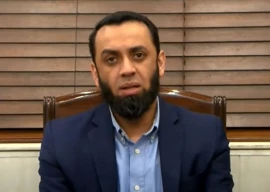Senior political and bureaucratic sources in the government in detailed background interviews shared these elements of national counter-terrorism policy which they said would be complete “in weeks”. The core element of this policy focuses on internal organised terrorism, whereas response to the foreign dimension of terrorist activity will come later, in months, these sources say.
NACTA, under the ministry of interior, will become the place where ongoing intelligence input from both military and civilian intelligence agencies will be shared. The aim is to develop a comprehensive profile of the terrorism threat and the operational requirements of dealing with more urgent challenges.
At present, there is no collective pool of information at any level that can help shape policy guidelines and determine responses to even clearly identified threats.
Interior Minister Chaudhry Nisar Ali Khan learnt about this chaotic state of affairs through several first-hand encounters in the first few weeks after taking charge. In one instance a tip-off from the ISI about two terrorists entering Islamabad led him to issue red-alert for the capital city only to discover hours later that his directions had not changed anything in Islamabad administration’s response. Neither at the check-posts nor at the entry points was any special effort mounted to match the intelligence about possible terrorism.

The second instance was even more shocking. Mature intelligence about an imminent attack on Benazir Bhutto Airport and the adjacent Nur Khan Air-base prompted him to issue another red-alert only to discover the next morning that apart from un-enthusiastic and partial deployment at the usual points, no extraordinary measures were in place.
“I was told that there was not enough manpower available to secure the airport, which remained unprotected from three sides,” said the minister in an interview last week. He also complained that generally high-level orders do not even trickle down at the operational level.
Even worst was the follow-up. To the question as to where did the two terrorists go who had reportedly entered Islamabad, the minister said: “Nobody knows. May be they are being tracked but we don’t know. They could potentially be still around”.
NACTA is supposed to change this spot-gap, today-we-see it-tomorrow-we-won’t intelligence sharing problem. Conceived as a 24x7 set up where intelligence is collected, collated, turned into actionable information and then quickly passed on to the relevant departments for swift action and with determined follow-up. At least this is the plan.
It is unclear what would be the mechanism to bring this information (especially from the non-civilian intelligence agencies) into the system and how will leads to bust terrorist activities be developed. Daily meetings of mid-level representatives are being planned, for starters. Normally, intelligence agencies jealously guard “their turfs” and are averse to the idea of working in cooperation with others. That is why intelligence agencies often make overlapping efforts at the operational level.
NACTA aims to bridge this functionality gap and change the mind-set of distrust. The start to this initiative has been promising. Sources claim that the army high command has opened up to the civilian leadership in a manner never before on this subject. At the ISI headquarters briefing where the prime minister had gone with his core team the discussions centred around the concept of “intelligence sharing”. It was agreed that there has to be tactical level independence for each intelligence agency, while the strategic level information sharing can be done more openly and efficiently. “This briefing was very important for integrating military and civilian point of views on how best a national counter-terrorism policy can function”, said a senior civil servant. The army high command agreed to assist the civilian leadership with expertise and resources in creating a powerful national structure to supervise counter-terrorism operations, the same source claimed.
However, not everything has been reconciled. Difference of opinion persists on the enhancing the capability of civilian institutions in carrying out the directives of counter-terrorism policy.
Chaudhry Nisar was candid in admitting that there is a near-complete “famine of good officers” who could implement orders.
“The level of apathy in the administrative cadres is appalling… the police we have is a sitting duck,” he said.
Nawaz is taking keen interest in raising some sort of a quick reaction force that, according to one of his close associates, “would have a separate command structure, light public presence, and lurk in the background only to come forward and be deployed in areas of extreme concern and grave problems.”
The army high command, sources claim, thinks this is a “medium to long-term” planning whereas the problem that Pakistan is facing requires a solution “now”. But the prime minister and his team is quite determined to raise this force, whose starting point will be a small unit raised in Islamabad.
Parallel to this force, the legal regime that would effectively prosecute terrorists and ensure that trials are not held up for years without result too is being streamlined even though, sources say, this is a far more complex task than anything else.
But most of these key elements of national security policy would eventually be sorted out in a National Security Council type of a set-up whose mandate, scope and functions are being debated in the military and civilian circles.
At present, there is not a single institution that would allow all principal policymakers to sit around one table and take collective decisions on terrorism-related issues and other matters of core concern. Most of the meetings that take place between the civilian and military leaders are either informal or occasional. The defence committee of the cabinet has a limited mandate and remains an exceptional arrangement. The ongoing issues require swift crafting of consensus between civilian and military sides of policymaking apparatus. For this no mechanism exists.
The deficiency has reflected in many spectacular embarrassments Pakistan suffered in recent years on account of disjointed, and completely divergent responses to national issues.
There are other major issues that require fine-tuning of perspectives between the military and civilian sides: Afghanistan and India are prime examples of this category of high-profile matters of national security. Sartaj Aziz’s visit to Afghanistan in the midst of a war of words between Kabul and Islamabad has taken place against the background of these differences.
The composition of this apex body is not final yet but senior political sources say that this would include members of “all those institutions that deal directly with external and internal threats”, and will be chaired by the prime minister.
This effectively means the three services chiefs besides chairman joint chiefs of staff committee and intelligence heads. It is not clear whether this body would have the chief ministers or not.
Published in The Express Tribune, July 23rd, 2013.
COMMENTS (8)
Comments are moderated and generally will be posted if they are on-topic and not abusive.
For more information, please see our Comments FAQ




1731325890-0/trump-(24)1731325890-0-165x106.webp)












Govt moving in the right direction but to be successful, cleansing of political leadership and agencies of foreign sponsored individuals and terrorist sympathisers is imperative.
@Usman Hassan:
correct. the NSC would bridge the military civilian divide on political and governance issues. it could have been expanded to have the NACTA work underneath it. never let a good thing flourish seems to be our collective psychology.
You don't need another bureaucracy to develop a policy - further terrorism has been a top issue in Pakistan for almost a decade and article implies that no policy exist by either the Civilian or Military concerning terrorism --- that's almost unbelievable but if true how's the creation of another bureaucracy going to resolve that level of inept/incompetence/indifference? The ultimate solution to many of Pakistan's problems is simple - act like a real Democracy where the elected Civilian leaders set policy and the military reports to the elected leaders.
This verifies that General Jahangir Karamat and Pervez Musharraf were right in suggesting and implementing the National Security Council respectively.
Good to see there is at least a plan in their minds and they are working on it. The only problem I see is that of our security agencies. I doubt if they would work in collaboration with the civilians. Generally, they are not willing to let anybody even come close to them. So the biggest problem is this “superiority complex" of our military.
S.W.A.T Pakistan
Include in this plan to use your influence and brotherly relations with Saudi Arabia to stop their funding networks and spreading sectarianism.
Sound like a good plan but does the government and agencies have a will to do it?
I wonder what ground actions Mr. Nisar took after he found out that his red alert were not worth more than the paper they were issued on? There must be a mechanism to check if these actions do trickle down to those who are on the ground and how they react on them. Obviously we have colossal failure/disconnect among different agencies and we must fix it.